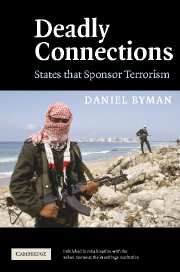Book contents
- Frontmatter
- Contents
- List of tables
- Acknowledgments
- List of acronyms
- Map: A political map of the Middle East and South Asia
- 1 Introduction
- 2 Why do states support terrorism?
- 3 The nature and impact of state support
- 4 Iran and the Lebanese Hizballah
- 5 Syria and Palestinian radical groups
- 6 Pakistan and Kashmir
- 7 Afghanistan under the Taliban
- 8 Passive sponsors of terrorism
- 9 The difficulties of stopping state sponsorship
- 10 Halting support for terrorism
- Appendix: Major terrorist groups
- Bibliography
- Index
7 - Afghanistan under the Taliban
Published online by Cambridge University Press: 05 September 2012
- Frontmatter
- Contents
- List of tables
- Acknowledgments
- List of acronyms
- Map: A political map of the Middle East and South Asia
- 1 Introduction
- 2 Why do states support terrorism?
- 3 The nature and impact of state support
- 4 Iran and the Lebanese Hizballah
- 5 Syria and Palestinian radical groups
- 6 Pakistan and Kashmir
- 7 Afghanistan under the Taliban
- 8 Passive sponsors of terrorism
- 9 The difficulties of stopping state sponsorship
- 10 Halting support for terrorism
- Appendix: Major terrorist groups
- Bibliography
- Index
Summary
Al-Qa'ida (Arabic for “the foundation” or “the base”) is the most lethal terrorist group in modern history. The attacks it conducted on September 11, 2001 killed almost 3,000 people, far and away the bloodiest single terrorist attack ever. The movement has also conducted or supported dozens of other terrorist attacks, backed a range of ferocious Islamist insurgencies that have killed tens of thousands, and promulgated a violent ideology that glorifies violence in the name of God.
Al-Qa'ida is often portrayed as an organization that lacks a state sponsor. Terms like “postmodern” and “networked” are regularly used to characterize the movement and to suggest that it does not depend on any state for its survival. However, from May 1996 until the end of the 2001, al-Qa'ida was based in Afghanistan and enjoyed tremendous support from the ruling Taliban regime there. Mullah Omar and other Taliban leaders provided al-Qa'ida with a haven from which it could launch attacks, train recruits for a variety of jihads, and otherwise conduct its struggle against the United States, moderate Arab regimes, and other governments it opposed. Al-Qa'ida did not depend on the Taliban for its survival, but the Taliban's support proved vital for many of the organization's achievements.
By any sensible definition of state sponsorship, the Taliban's Afghanistan qualifies as a highly energetic and enthusiastic sponser.
- Type
- Chapter
- Information
- Deadly ConnectionsStates that Sponsor Terrorism, pp. 187 - 218Publisher: Cambridge University PressPrint publication year: 2005

